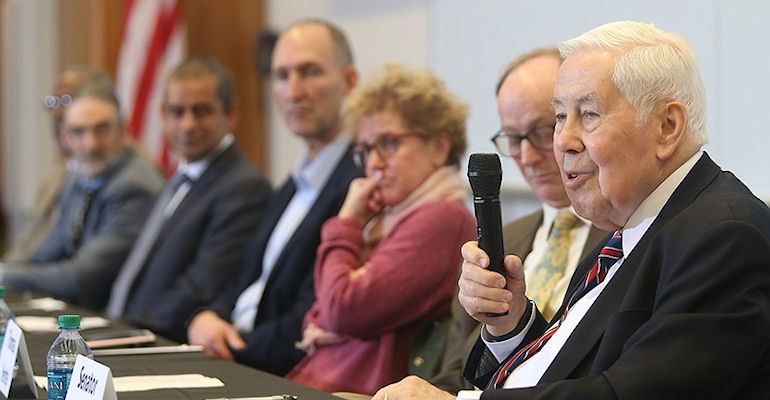Food security panel calls for more education, collaboration
Purdue hosts roundtable discussion on global food security and identifies need for universities to work together more.
May 2, 2018

Richard Lugar, former U.S. senator from Indiana, joined a panel of six Purdue University College of Agriculture faculty and staff members April 30 for a roundtable discussion on global food security.
Lugar -- who currently serves as president of The Lugar Center, a Washington, D.C.-based nonprofit organization focusing on global food security, WMD nonproliferation, aid effectiveness and bipartisan governance -- emphasized the important role of research and education in fighting global hunger.
“We really have to support universities in about every country in the world,” he said. “They will share our research, and we will learn from them. There has to be some basis on which countries gain the knowledge that is required to have some hope for food sufficiency.”
Lugar was joined on the panel by Purdue agronomy professor Sylvie Brouder; Gary Burniske, managing director of the Purdue Center for Global Food Security; agricultural and biological engineering professor Indrajeet Chaubey; distinguished professor of agronomy and 2009 World Food Prize laureate Gebisa Ejeta; distinguished professor of agricultural economics and Global Trade Analysis Project founder and executive director Thomas Hertel, and agricultural and biological engineering professor John Lumkes. Karen Plaut, interim dean of the College of Agriculture, hosted the panel.
Panelists addressed the complexity of food insecurity and its relationship to economic, political, geographic and cultural factors.
“We’ve talked about water quality, we’ve talked about soil health, we’ve talked about mechanization, we’ve talked about global to local, we’ve talked about the role of universities and extension research and education in making this happen,” Plaut said. “It’s all of us that will make the difference in the long term.”
Ejeta noted that roughly 800 million people around the world experience food insecurity, many of them children. He stressed that the issue must be addressed across disciplines.
“There is not a better model for the trans-disciplinary approaches than the land-grant university model of education, research and extension,” Ejeta said.
Brouder noted that developing new technologies was not enough; those technologies had to be practical and useful for producers around the world.
“Part of our role as a land-grant university is to identify the technologies that can be adopted and show how they should be adopted,” she said.
You May Also Like


.png?width=300&auto=webp&quality=80&disable=upscale)
